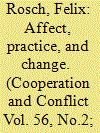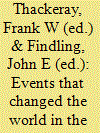| Srl | Item |
| 1 |
ID:
178689


|
|
|
|
|
| Summary/Abstract |
How do practices change? To approach this in practice theory (PT) is a widely debated question. This article brings PT in conversation with the study of emotions in International Relations by considering the role of affect in practice changes. For it is affect that permeates the placiotemporal and bodily constellations during practice performances, continuously provoking changes in and through practices. In initiating this conversation, this article adds to current PT literature by arguing that world political transformations not only find their origin in external conditions, identified as such through individual reflection, but also in affective dynamics of the everyday. To elaborate this more theoretical argument, this article evolves against the empirical backdrop of dancing as an everyday international practice at the Congress of Vienna (1814–1815). Affect that permeated dances in Vienna not only substantiated changes in this practice but, with the waltz replacing the minuet as the preferred dance among international political decision-makers, also changes through it occurred. While the minuet embodied collective sentiments of a transboundary European elite, the waltz helped to further national imaginations of world politics.
|
|
|
|
|
|
|
|
|
|
|
|
|
|
|
|
| 2 |
ID:
193151


|
|
|
|
|
| Summary/Abstract |
Diplomatic equality, the equality that exists between states in their diplomatic interactions, is one important feature of contemporary diplomacy. The objective of this article is to show how and why diplomatic equality developed over the last centuries. This exploration begins in early modern Europe, then turns to the nineteenth century to illustrate changes and continuities, and then moves on to Japan to illustrate how regional European practices became globalised. Finally, it discusses how diplomatic equality became dominant in the twentieth century and then suggests some major reasons for this transformation in diplomatic practices.
|
|
|
|
|
|
|
|
|
|
|
|
|
|
|
|
| 3 |
ID:
001176


|
|
|
|
|
| Publication |
Westport, Greenwood Press, 1996.
|
| Description |
x, 217p.Hbk
|
| Standard Number |
0313290768
|
|
|
|
|
|
|
|
|
|
|
|
Copies: C:1/I:0,R:0,Q:0
Circulation
| Accession# | Call# | Current Location | Status | Policy | Location |
| 040729 | 909.81/THA 040729 | Main | On Shelf | General | |
|
|
|
|